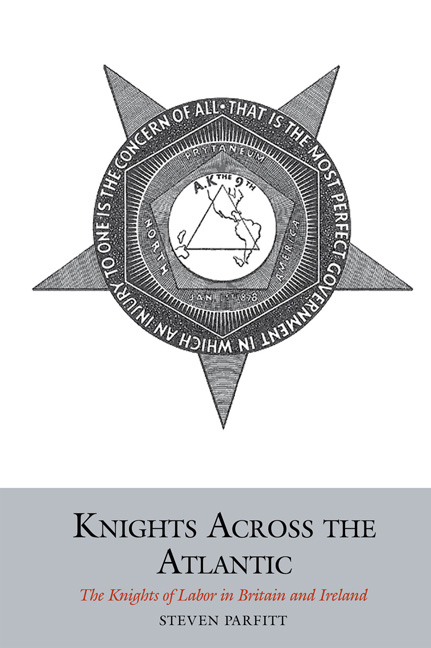Book contents
- Frontmatter
- Contents
- Acknowledgements
- Introduction: The World of the Knights of Labor
- 1 Origins
- 2 The Rise of a Transnational Movement
- 3 Organisation, Culture and Gender
- 4 The Knights in Industry
- 5 The Knights and Politics
- 6 The Knights and the Unions
- 7 The Fall of a Transnational Movement
- Conclusion: The Knights of Labor in Britain and Ireland
- Appendix: List of Known Assemblies of the Knights of Labor in England, Scotland, Wales and Ireland
- Bibliography
- Index
5 - The Knights and Politics
- Frontmatter
- Contents
- Acknowledgements
- Introduction: The World of the Knights of Labor
- 1 Origins
- 2 The Rise of a Transnational Movement
- 3 Organisation, Culture and Gender
- 4 The Knights in Industry
- 5 The Knights and Politics
- 6 The Knights and the Unions
- 7 The Fall of a Transnational Movement
- Conclusion: The Knights of Labor in Britain and Ireland
- Appendix: List of Known Assemblies of the Knights of Labor in England, Scotland, Wales and Ireland
- Bibliography
- Index
Summary
In February 1887, representatives of ironworkers throughout the Black Country met at Brierley Hill to discuss whether they should attend a conference organised by trade unionists in the north of England. A delegate from the Corngreaves works in Cradley Heath suggested that they form assemblies of the Knights of Labor instead. The representatives then debated the relative merits of each organisation and argued over the costs that each would impose on their members. One delegate then introduced a new theme into the discussion. ‘He objected,’ one newspaper reported, ‘to the introduction of politics in trade matters.’ Many of his colleagues voiced their agreement. ‘The Knights of Labour,’ he continued, ‘were always interfering in politics.’ After his speech, the meeting then voted to attend the conference instead of joining the Knights. The speaker's fears were also confirmed by the Order's history in Britain and Ireland. Over the course of that history the Knights of Labor certainly interfered in politics.
American Knights always remained ambivalent about the Order's political role. Terence Powderly saw it as something ‘more and higher’ than a political party. Partisan loyalties had often divided the American labour movement in the past, most notably the Order's predecessor in the 1860s and 1870s, the National Labor Union. Powderly and other leading Knights enjoined their members to keep party politics out of the assemblies, and counselled further education in the principles of philosophy and political economy instead. Practical political concerns found their way into the Knights of Labor anyway. The glassworkers of LA300 paid Ralph Beaumont to lobby the Houses of Congress for legislation in the working-class interest. Knights pioneered the practice of ‘rewarding friends and punishing enemies’ whereby they encouraged members to vote for candidates who endorsed the Order's programme, which later became the stated policy of the American Federation of Labor. The Knights never officially aligned themselves with a political party until the mid-1890s, when the last surviving assemblies briefly cast their lot with the Populist Party. All the Order's leaders, however, dabbled in partisan politics at some stage. Uriah Stephens resigned as Grand Master Workman to run for Congress as a Greenback-Labor Party candidate; Powderly, his successor, became Grand Master Workman while already serving as the Mayor of Scranton, Pennsylvania.
- Type
- Chapter
- Information
- Knights Across the AtlanticThe Knights of Labor in Britain and Ireland, pp. 135 - 163Publisher: Liverpool University PressPrint publication year: 2016



